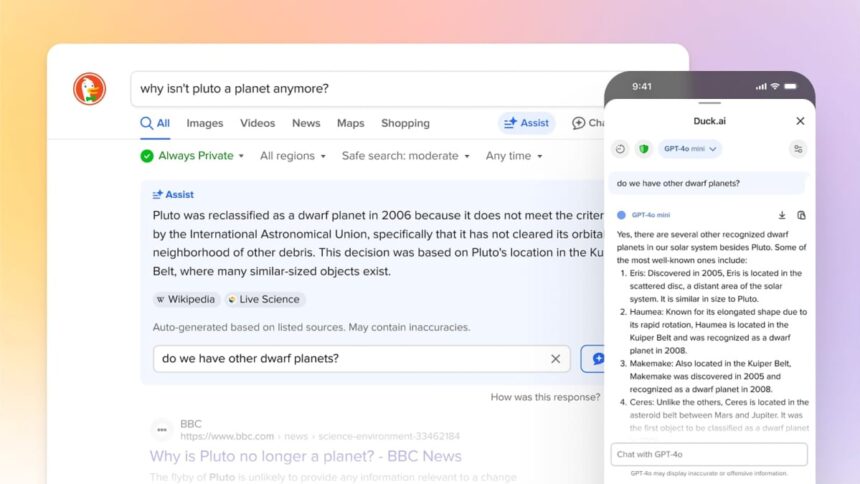DuckDuckGo Unveils AI Features: A Privacy-Centric Approach
Following an extensive period of beta testing, DuckDuckGo has officially launched its AI enhancements, which also come with several updates. These features are complimentary, although there are certain limitations, and they embody DuckDuckGo’s pledge to safeguarding user privacy—no account creation is required, and user searches remain untracked.
Similar to other search engines like Google, Bing, and ChatGPT, users can now receive AI-generated answers to their queries on DuckDuckGo. These responses appear in a modestly sized box labeled as “Assist,” maintaining a lower profile compared to those on Google or Bing. This reflects DuckDuckGo’s minimalist philosophy regarding feature implementation.

Credit: DailyHackly
DuckDuckGo’s CEO, Gabriel Weinberg, emphasizes, “Our aim is not to add AI features for the sake of it. They need to genuinely enhance daily convenience, specifically by enabling users to get quicker, high-quality responses to their inquiries.”
To tailor the amount of AI intervention in search results, users can navigate to the DuckDuckGo settings page. Under the section titled AI Features, there is a dropdown option allowing you to select from Never, On-demand, Sometimes, or Often. For those who choose either of the last two options, DuckDuckGo will apply its discretion to determine which queries may benefit from AI assistance.
The second component of the AI offering is the Duck.ai chatbot, enabling follow-up inquiries whenever an AI Assist response is provided in search results. Additionally, users can access this feature through a dedicated web portal, gaining exposure to various AI models, including GPT-4o mini, Llama 3.3, and Claude 3 Haiku.

Credit: DailyHackly
Interactions with the AI are never stored on DuckDuckGo’s servers nor are they utilized to train AI systems. Users can clear their chat histories using the flame icon located in the toolbar on the right side. The goal is to encourage users to blend web searches, AI assistance, and AI chat for optimal answers.
If curious about how this model stays free while respecting privacy, DuckDuckGo generates revenue through advertising—though these ads are less personalized compared to Google, as DuckDuckGo does not track extensive user data. Furthermore, the company is contemplating a premium model for enhanced access to advanced AI features and additional chatting capabilities, complementing its existing $10-per-month pro plan, which includes a VPN and additional benefits.
Evaluating the DuckDuckGo AI Features
Using the new AI capabilities resulted in a user experience that aligns perfectly with DuckDuckGo’s ethos of simplicity and straightforwardness. The interface is intuitively designed, allowing seamless access to the tools without unnecessary complexity.
With the setting enabled to Sometimes, DuckDuckGo accurately determines when AI intervention is advantageous. Historically, search engines have been eager to embrace AI technologies due to instances where queries—like “how does DNA work?” or “how do I troubleshoot a computer that doesn’t boot?”—are better addressed by an AI rather than traditional results, particularly when follow-up questions can be posed for clarification.

Credit: DailyHackly
For more conventional searches, such as “Eiffel Tower” or “intermittent fasting,” DuckDuckGo adheres to a traditional approach since AI hasn’t experienced locations firsthand or engaged in dieting. If an AI response is desired but not displayed, users can activate it by clicking the Assist button.
While many AI providers may approach accuracy ambiguously, DuckDuckGo actively has addressed the accuracy issue: AI Assist results are based on the reliability of their sources, implementing safeguards to prevent low-quality or parody sites from influencing outcomes, while user feedback enhances the verification process. The sources of the AI-generated answers are always transparently provided, allowing easy access to the original pages.
In tests involving technology questions, the AI Assistant consistently pulled from reputable online sources and conveyed the information accurately. Potential concerns over a future where AI becomes the sole answer source, with diminishing human input online, remain a topic for later discussion.

Credit: DailyHackly
While using the Duck.ai chatbot proved somewhat infrequent for follow-up questions, switching to manual chatbot access is feasible. However, users will encounter the limitations of knowledge cut-off points across various models, which are based on historical data rather than real-time online information. Enhanced integration between live web searches and AI functions is clearly necessary.
Overall, DuckDuckGo appears to strike an appropriate balance for those wishing to avoid AI overkill: the AI Assist feature is not omnipresent, allowing it to blend into the background unless required. Responses are concise and precise, and despite a competitive landscape, DuckDuckGo’s commitment to privacy is a comforting differentiator.












